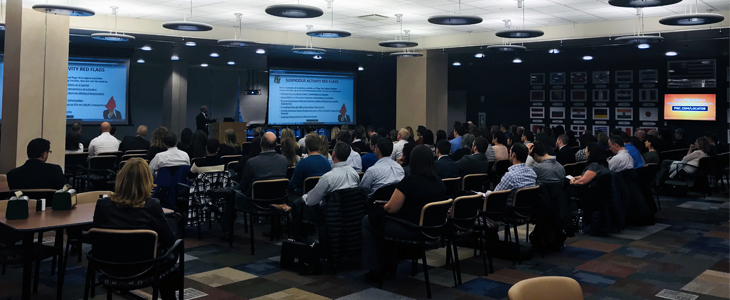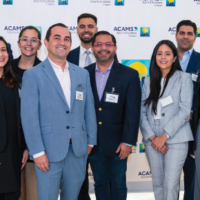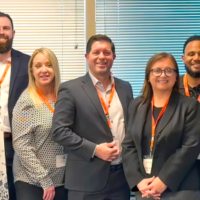
What an exciting year! The Pittsburgh Chapter celebrated its first anniversary this past September. Since our launch, the Pittsburgh Chapter has held four events and we are looking to finish 2018 with one last event on November 29. During this rollercoaster year, we have been able to continually grow our membership at a steady pace while attempting to offer educational events to our membership.
Pittsburgh Chapter Launch Event
Our launch event occurred on November 9, 2017, and was located at PNC Firstside. Mike Rodriguez, former ACAMS chapter development manager, gave opening remarks to welcome the Pittsburgh Chapter into the ACAMS family, shared excitement for the new chapter, and shared ACAMS' mission/goals and how they align with the Pittsburgh Chapter. The event featured keynote speakers Salim Jackson from the Pennsylvania Gaming Control Board and David Vanderaar, gaming supervisor from the Pennsylvania State Police Bureau of Gaming Enforcement who spoke on “Casino Gaming Enforcement: Investigations, Auditing, Fraud Prevention and Anti-Money Laundering.” Jackson and Vanderaar provided a law enforcement perspective on casinos and financial crimes.
Key Takeaways From the Event
- Structuring plays a major role into money laundering in casinos.
- Several casinos are listed on the 314(b) participant list and law enforcement could use 314(a) for casinos or financial institutions. These are valuable tools for communication.
- The Racketeer Influenced and Corrupt Organizations Act is commonly used for individuals when figuring out charges because individuals will travel between several locations and states.
- Red flags for money laundering in casinos include patrons engaging in minimal gaming activity without reasonable explanation, individuals that will provide false identification or information, and layering transactions to attempt to disguise true source of funds.
Recent Industry Trends and What It Means to the Future of the AML Professional
Kicking off 2018, we had an event at PNC Firstside on March 18. The keynote speaker was Jim Candelmo who is the chief anti-money laundering officer (CAMLO) with Capital One and a member of the ACAMS advisory board. The presentation “Recent Industry Trends and What It Means to the Future of the AML Professional” focused on issues from a CAMLO perspective. We thank Capital One for being an event sponsor for the event as well.
From the CAMLO Vantage Point
- Adequate resources need to be devoted to financial crime risk management and control structures to accommodate increasing expectations.
- The overreaching umbrella of compliance risk management should cover anti-money laundering (AML), fraud, and cyberthreats since they often resemble each other.
- As business models change, technology is transformed and operating processes evolve. Closer connectivity should exist between operational and AML risk.
- Technology systems will need to be continuously updated to keep up with sophisticated products, transactions and payments.
- In the future, AML professionals will require sophisticated skill sets beyond traditional AML compliance experts, as financial crime continue to coverage.
Key Takeaways From the Event
- With great data, comes great responsibility.
- The landscape is always changing and there is always a need to adapt.
- Do not be on the end of a conversation indicating that “you should have known.”
Human Trafficking Seminar
The next event on June 7 included keynote speakers Dr. Mary Burke PhD of Carlow University and The Project to End Human Trafficking and Kaitlyn Weismann from the FBI who conducted a “Human Trafficking Seminar” at the Bank of New York Mellon Center. During the presentation, Dr. Burke provided an academic and research perspective, while Weismann balanced the second half of the presentation from a law enforcement perspective. Both presentations provided a definition of human trafficking, red flags and ways to prevent human trafficking. We thank Carlow University and The Bank of New York Mellon for being a sponsor for the event as well.
Key Takeaways From the Event
- How do we tell the difference between prostitution and human trafficking? It is hard since there are similar red flags which is why law enforcement advises to list “advisory human trafficking” in cases, even when you think it is prostitution.
- If the subject is under 18, it is always considered sex trafficking; even if the person appears to be willingly engaging in prostitution.
- Labor trafficking red flags include numerous rental payments in an account. These numerous payments might appear as business activity in a personal account, but really could lead to something more complex.
- Social media is still very huge in human trafficking. Snapchat is the preferred method due to conversations deleting after being viewed.
- Suspicious activity reports (SARs) matter, big or small. If you are filing a low-dollar SAR and question whether it is worth it, remember ten financial institutions could be filing on the same person which helps create a larger picture for law enforcement.
AML Enforcement and Cannabis Banking
Our third event for 2018 occurred on September 20 at the Rivers Casino. The event featured keynote speaker Travis Nelson from Holland & Knight LLP who presented on “AML Enforcement and Cannabis Banking.” Nelson took a hazy topic and made it clear for the audience. No one left in a cloud of smoke due to his wisdom.
Key Takeaways From the Event
- Examiner's focus: traditional money laundering schemes, new payment approaches, risk policies and procedures, risk appropriate controls and implementation of the beneficial ownership rule.
- Review other enforcement actions to learn what the regulators are looking for.
- Key supervisory expectations for AML include board and senior management are appropriately informed of AML program requirements, adequate funding and resources for the compliance program, periodic substantive training and testing of personnel, proper reporting lines for Bank Secrecy Act compliance head and periodic compliance tests that are followed by appropriate remediation.
- Determine your financial institution's risk appetite for marijuana-related businesses (MRBs).
- Three levels of MRBs: Tier 1 “Touch the Plant” companies, Tier 2 companies that service the Tier 1 companies, and Tier 3 companies that service Tier 1 and 2 companies (certified public accountants, lawyers, etc.).
- Cannabis is still considered a Schedule 1 (I) drug in various forms.
- The two types of marijuana SARs are “Marijuana Limited” SARs and “Marijuana Priority” SARs.
- The states serve as testing grounds for laws. It will be interesting to watch what happens in California over the next year.
Virtual Currency Seminar
Rounding out 2018 will be our upcoming event on November 29, which will be held at the Rivers Casino. This event will be unique from previous events. First, we are offering a “Pre-Event” seminar. This seminar, presented by Coinbase, will be an overview of virtual currencies and blockchain to provide individuals with a better foundation of these topics. Next, we will have our “Main Event” seminar. This seminar will offer a presentation on “AML Virtual Currency Investigations” presented by Coinbase. Following the presentation, we will have a “Panel Discussion on Virtual Currency.” This discussion will feature our keynote speakers Katherine Johnson, who is the director of compliance regulation from Coinbase and, David Bitkower, who is a partner and fintech expert from Jenner & Block.
Conclusion
As we prepare to close out on 2018, we are already looking ahead to 2019. In August 2018, we surveyed our membership to provide feedback from our previous events, feedback on what we can build on for future events, and gain interest in what topics that you want to hear about. We are using this information to help build another exciting event list in 2019. Stay tuned for future announcements.
All these events would not have been possible without the support and enthusiasm of our sponsors PNC, WesBanco, Oxford Solutions and Gannon University. We would like to thank them all for their continued support and we look forward to working together in 2019 and continuing our discussions on various topics.
For a more in-depth overview of our events and membership details, as well as information about upcoming events, please visit our chapter page, LinkedIn and Twitter. Questions for the chapter can be sent via email to pghacams@gmail.com.










